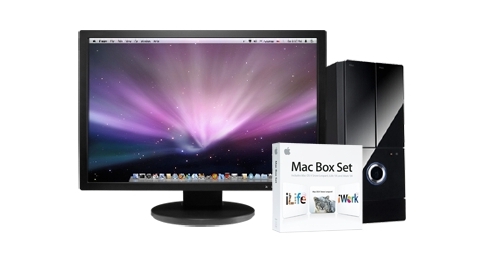While some say Psystar has a shot at winning the ongoing legal battle it’s engaged in with Apple, there’s at least one aspect that acts as a big bump in the company’s road to victory – Apple’s claim that it is offering a complete product by selling Macintosh computers with Mac OS X. Psystar is capitalizing on Apple’s work by taking one piece of Apple’s product and selling it for something else. Apple also claims Psystar is selling an inferior product that is affecting its standing in the marketplace.
A Miami New Times report looks at the Mac cloner’s business, as well as its founders’ backgrounds, which, apparently, could well be used for a drama. Running the company are the Pedraza brothers, whose drug-dealing father was arrested and imprisoned, while the mother didn’t exactly provide them with the support they needed either. Add the crippled society we live in into the mix and you’ve got yourself two determined individuals. So determined, that they decided to take on one of the biggest corporations out there, for pricing their products too high. Think of Psystar as Robin Hood taking from the rich and giving to the poor. Only this Robin Hood is also keeping some loot for itself. What can you do? Times are hard...
However, there’s a glitch in Psystar’s “program.” Whether it likes it or not, Apple did develop Mac OS X on its own (more or less) and, as a result, it’s the company’s to sell and retain legal rights over. Although there are laws saying that, once you buy something, it’s yours to do whatever you like with it, Apple’s Mac OS X may not be that “something.” In fact, it may just prompt lawyers and judges to “think different.” Here’s what we mean by that.
With Apple (computers), you are offered a product that’s meant to be used the way it was designed to be used. You alter that, and it’s not what you bought anymore. Apple sells complete solutions; the things that work out-of-the box; Macintosh computer + Mac OS X = Apple Product. One Apple product! You divide that, and you’re not getting what Apple was planning to offer you, as a customer. And, while it’s your right to be stupid and mess up your experience, it’s also Apple’s right to say, “We put hard work into this OS, so we ask that it’s used appropriately” [in a booming, baritone voice].

Take the license agreement that you say “yes” to when installing Mac OS X on a generic PC, modified to run Apple’s operating system (a Psystar computer, if you will). Mac OS X, being tricked into thinking the disc has been inserted into a Macintosh, will ask the user to say “yes” or “no” to a license agreement stipulating that the operating system should only be installed on an Apple-branded computer. By saying “yes,” you’re lying that you’re using a Mac. Sure, Apple is pricey and more people should get access to its solutions. It’s also not fair that the rich guys get all the chicks, but that’s just the world we live in.
The bottom line is that, today, there’s no cheaper way of using a Mac legally. All you can do is either buy a Mac for whatever price Apple sells it to you, or go for a clunky PC, and try to do your work using the OS that suits you best (except for Mac OS X). OR, you can always just wait for the law to change.
Apple holds that consumers who purchase a copy of its operating system don't actually own the software. And how could they? When you buy a book, you own the book, but do you own the words? No, you don’t. So, when the words say, “Use me with a Mac,” why be a wise guy?
Then again, some may remember a 2004 case involving Microsoft, when a court ruled that the Windows maker broke competition rules by tying the operating system to its media player, forcing the giant company to allow rival programs and pay $794 million in damages. It's not exactly the same thing, but the two cases are similar enough to compare.
Now that you're all confused, why don't you share your own thoughts in the comments.

 14 DAY TRIAL //
14 DAY TRIAL //